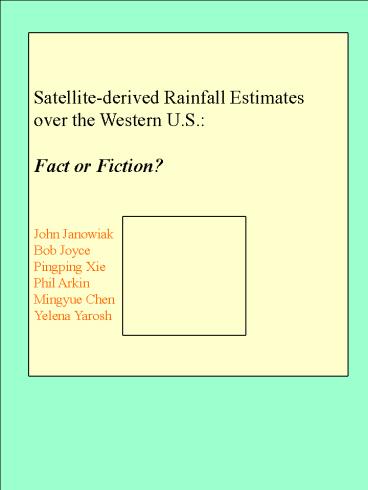Satellite-derived Rainfall Estimates - PowerPoint PPT Presentation
Title:
Satellite-derived Rainfall Estimates
Description:
Upwelling radiation is scattered by ice. particles in the tops of ... Conversion from retrieval to rain rate (algo.) Temporal sampling. ERRORS: LIMITATIONS: ... – PowerPoint PPT presentation
Number of Views:58
Avg rating:3.0/5.0
Title: Satellite-derived Rainfall Estimates
1
Satellite-derived Rainfall Estimates over the
Western U.S. Fact or Fiction? John Janowiak
Bob Joyce Pingping Xie Phil Arkin Mingyue Chen
Yelena Yarosh
2
OUTLINE
- Brief review of IR passive microwave info.
- Describe CMORPH
- Validation (US Australia)
- Simple gauge vs. satellite sampling study
- A look at western US precip
- Conclusions on-going work
3
Geostationary Polar
Infrared
4
Passive Microwave Emission
- most physically direct
- over ocean only
- polar platform only
Detects thermal emission from raindrops
Surface
5
Passive Microwave Scattering
- land ocean
- polar platform only
Freezing Level
6
(No Transcript)
7
3-hr mosaic good coverage but time of obs.
varies by 3 hrs
8
CPC Morphing Technique CMORPH Spatial
Grid 0.0728o lat/lon (8 km at
equator) Temporal Resn 30 minutes Domain
Global (60o N - 60o S) Period of record Dec.
2002 - present
Bob Joyce!
http//www.cpc.ncep.noaa.gov/products/janowiak/MW-
precip_index.html
Paper (Joyce et al.) submitted to J. Hydrometeor.
9
CMORPH is NOT
a precipitation estimation technique but
rather a technique that creates spatially
temporally
complete information using existing precipitation
products
that are derived from passive microwave
observations.
At present, precipitation estimates are used from
3 sensor types on 7 platforms
SSM/I (DMSP 13, 14, 15)
TMI (TRMM)
Soon AMSR (ADEOS-II) AMSR-E (Aqua)
10
(No Transcript)
11
(No Transcript)
12
(No Transcript)
13
http//www.cpc.ncep.noaa.gov/products/janowiak/us_
web.html
14
(No Transcript)
15
http//www.bom.gov.au/bmrc/wefor/staff/eee/SatRain
Val/dailyval_dev.html
16
Remote Sensing Errors Limitations
ERRORS
- Indirect estimates inferred radiometrically
- Instrument calibration
- Conversion from retrieval to rain rate (algo.)
- Temporal sampling
LIMITATIONS
- Measurements not temporally continuous
- Depending on instrument only convective
(scattering) precip. may be sensed
17
Raingauge Errors Limitations
ERRORS
- Wind gauge exposure effects
- Human element (time, accuracy)
- - Automated (calibration, maintenance)
- Biological contamination
LIMITATIONS
- Representativeness of area (point value)
- Spatially incomplete
- Available frequency (daily, 6-hr)
18
1o x1o box in s-central TN (July14, 2003)
Distribution of Rainfall by Amount
19
4 gauge 0.00 0.01 0.97 Radar
0.00 0.02 0.96 Cmorph 0.08
0.04 0.91
20
(No Transcript)
21
Gauge
40
22
Synthetic Data Sampling Study
Question Are there situations when an estimate
from satellite is better for assessing
area-mean precipitation than a measurement from
gauge(s)?
23
24
Approach (overly?) simplistic
- real-world nonzero rainfall
distribution characteristics not
modeled - on average, the of locations with
rain over an area is lt 50 used
here - rainfall generators exist that more
nearly duplicate the statistics of
actual rainfall over time-space - much
work on aspects of this topic done in
hydro. satellite sampling
communities (Bell et al. 1990,
1996, 2003)
25
Samples of synthetic precipitation within a 1o x
1o lat/lon box at satellite resolution Precip
amounts of 0 to 1 chosen randomly impose
condition that 50 are 0
26
1o x 1o lat/lon box containing 169 satellite
pixels
27
2 Gauges
28
3 Gauges
29
4 Gauges
30
5 Gauges
31
9 Gauges
X
X
X
X
X
X
X
X
X
32
13 Gauges
X
X
X
X
X
X
X
X
X
X
X
X
X
33
25 Gauges
X
X
X
X
X
X
X
X
X
X
X
X
X
X
X
X
X
X
X
X
X
X
X
X
X
34
Time series of absolute error (1st 100 days)
35
(90)
Perfect Gauge
10/ error (satellite)
100 error
200 error
36
Time series of absolute error
37
(90)
0-10 error
Perfect Gauge
0-50 error
0-100 error
0-200 error
Light blue 9 gauges Dark blue 5 gauges Green
3 gauges Red 1 gauge
38
RMSE
0.251 satellite (200 bias) 0.103
1 gauge 10 of earth 0.063 satellite (100
bias) 0.063 satellite (0-200 random)
0.054 2 gauges 0.033 3 gauges 0.023
4 gauges 0.021 5 gauges 0.016 satellite
(50 bias) 0.016 satellite (0-100
random) 0.011 9 gauges 0.009 13 gauges
0.009 satellite (0-50 random) 0.004 25
gauges 0.001 satellite (10 bias)
39
Number of HADS/RFC stations per ¼ degree lat/lon
grid box
(9/10/2003)
40
CAMS - 1 or more gauges per 1o Grid 10 of
earth (60N-60S) 29 of land
10 of earth (60N-60S) 29 of land area ( )
41
http//www.cpc.ncep.noaa.gov/products/janowiak/us_
web.html
42
Crude RH Adjustment to CMORPH
(Aug 2003)
Scofield, 1987 Rosenfeld and Mintz
(1988) McCollum et al. (2000)
43
CMORPH vs. gauge over NAME zones
44
CMORPH with RH adjustment vs. gauge over NAME
zones
45
Time series of statistics over 9 NAME Zones
46
Conclusions Fact or Fiction?
1. CMORPH estimates compare quite favorably to
raadar estimates over the US and to gauge
analyses over the US and Australia.
2. Satellite estimates of rainfall can be useful
over the western U.S. (and elsewhere) perhaps
better than gauge data in some situations
3. Many satellite techniques overestimate
rainfall considerably in semi-arid regions during
the warm season, but an RH adjustment is
promising.
47
Work in Progress
48
0 precip
0 lt precip lt 1
Long-term Box Mean 0.25 So, 200 error
0.500 100 error 0.250 50 error
0.125
49
Correlation with MW availability






























